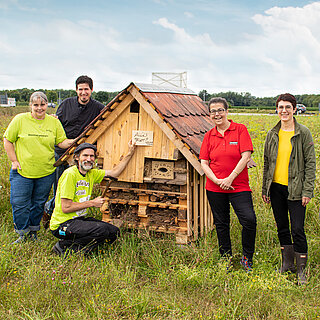Great habitat for small animals!

Wagner has created a unique habitat for endangered insects and many other small creatures as part of its ambitious participatory project "Woody loves bees". We have long been committed to protecting the environment and climate. This includes the creation of new, near-natural habitats that offer a great deal of ecological diversity, and thus also a lush food supply for honey bees and wild bees, bumblebees, butterflies and other small creatures such as hedgehogs and lizards.
Right next to the blue WAGNER factory II, a huge flower meadow is in full bloom on an area of 12,000 m². Rather unspectacular to human eyes, for the nutritious plants are mostly modest in growth and colour. For countless insects, however, they are real delicacies, because the selected varieties hold a rich supply of nectar and pollen, such as the fragrant, lilac-blue flowering Phacelia, also called "bee friend", which flowers well into autumn. In the "summer camp" at the edge of the flower meadow, 300,000 bees have moved into five hives and are busy producing delicious honey. At the edge of the area, we have created a new home made of dead wood, bricks and stone slabs for lizards and other small animals. The self-built "hotel", which has been worked out down to the smallest detail, has also been completed and set up. It provides shelter, nursery and winter quarters for numerous wild bees and other insect species, but also for bats, lizards and hedgehogs. Wagner’s passionate cooperation partners made the ambitious project possible. The farmers Theo and Sigmund Heitz manage the area; the beekeeper’s Timo Ostermann bees populate the "summer camp". Michael Kempf, Andreas Hummel and Sylvia Lauf from the adventure playground in Lahr made the construction of the "hotel" and "lizard home" possible with a lot of commitment.
The aim of the large-scale hands-on project "Woody loves bees", presented by Wagner's brand ambassador "Woody", is to motivate as many people as possible to create new livelihoods for endangered species in a simple way that is easy for everyone to implement. This can be done very simply "on a small scale"; the smallest balcony, terrace or garden can help many small animals find food and shelter with little effort.